High blood pressure and hypertensive heart disease
Apr 19, 2022
Hypertensive heart problem is the top cause of mortality and is linked to high blood pressure. It is a general term that is used to denote a group of disorders which includes failure of heart, left ventricular hypertrophy or excessive thickness of heart muscles and ischemic heart disease. India is considered the heart disease capital of the world. Studies suggest that by 2022 60% of the deaths related to heart disease shall be in India. It is hence important for us to know about heart disease and its various forms.
Heart Failure
Failure of heart does not mean that the heart is not functional anymore. It rather means that pumping power of the heart has gone weaker than normal or the elasticity of heart has reduced. With failure of heart, blood flows from the pumping chambers of heart less effectively and pressure within heart increases thus making it harder for heart to deliver nutrients and oxygen to our body.
To compensate for declined pumping power, the chambers of heart stretch for holding more blood. This keeps the blood flowing however, over time, the muscles of heart walls could weaken to the extent that they are not able to pump adequately. Resultantly, kidneys may often respond by making our body retain the fluid like water and sodium. This causes fluid buildup in arms, feet, legs, ankles, lungs, etc and is known as congestive heart failure.

High blood pressure can also lead to heart failure by leading to left ventricular hypertrophy. This is a thickening of muscles of heart which results in reduced effectiveness of muscle relaxation in between the heart beats. This causes difficulty to the heart in filling with adequate blood for catering to the organs of our body, especially while exercising, leading our body to hold onto the fluids and our heart rate to rise.
Ischemic Heart Disease
High blood pressure may also lead to Ischemic heart disease which means that the muscles of heart are not getting adequate blood. It is usually a result of atherosclerosis or the hardening of arteries that impedes flow of blood to the heart. The symptoms of it include chest pain traveling to arms , neck, back and jaws, chest pain with sweating, nausea, shortness of breath, irregular pulse and fatigue
Diagnosing Hypertensive Heart Disease
Below are the signs of hypertensive heart disease
- High blood pressure
- Enlarged heart & irregular heart beats
- Fluid in lungs or the lower extremities
- Unusual sounds of heart
The tests that your doctor could perform could include electrocardiogram, cardiac stress test, echocardiogram, X ray of Chest and a coronary angiogram.
Treating Hypertensive Heart Disease
A doctor needs to treat high blood pressure in order to cure hypertensive heart problem. They can treat it using several drugs i.e. beta-blockers, diuretics, Calcium channel blockers, ACE inhibiters, vasodilators and angiotensin receptor blockers.
Additionally the doctors could advise you to change your lifestyle as per below:
- Diet – In the presence of heart failure, daily intake of sodium shall be reduced to 1500 mg per day. You shall eat food rich in fiber and potassium and restrict the daily calories for losing weight if needed. You shall restrict food with refined sugar, cholesterol and trans fats.
- Avoid alcohol and tobacco
- Monitor your weight– Record your weight daily and increase your daily activities as per your doctor’s advice.
- Regular medical checkup – Get your routine medical checkups done to ensure the trend of your heart’s disease.







